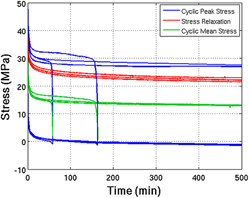Crossref Citations
This article has been cited by the following publications. This list is generated based on data provided by
Crossref.
Amel, Hoda
Rongong, Jem
Moztarzadeh, Hadi
and
Hopkinson, Neil
2016.
Effect of section thickness on fatigue performance of laser sintered nylon 12.
Polymer Testing,
Vol. 53,
Issue. ,
p.
204.
Türk, Daniel-Alexander
Brenni, Franco
Zogg, Markus
and
Meboldt, Mirko
2017.
Mechanical characterization of 3D printed polymers for fiber reinforced polymers processing.
Materials & Design,
Vol. 118,
Issue. ,
p.
256.
Miller, Andrew T.
Safranski, David L.
Smith, Kathryn E.
Sycks, Dalton G.
Guldberg, Robert E.
and
Gall, Ken
2017.
Fatigue of injection molded and 3D printed polycarbonate urethane in solution.
Polymer,
Vol. 108,
Issue. ,
p.
121.
Lammens, N.
Kersemans, M.
De Baere, Ives
and
Van Paepegem, W.
2017.
On the visco-elasto-plastic response of additively manufactured polyamide-12 (PA-12) through selective laser sintering.
Polymer Testing,
Vol. 57,
Issue. ,
p.
149.
Tasch, David
Mad, Anna
Stadlbauer, Robert
and
Schagerl, Martin
2018.
Thickness dependency of mechanical properties of laser-sintered polyamide lightweight structures.
Additive Manufacturing,
Vol. 23,
Issue. ,
p.
25.
Safai, Lauren
Cuellar, Juan Sebastian
Smit, Gerwin
and
Zadpoor, Amir A.
2019.
A review of the fatigue behavior of 3D printed polymers.
Additive Manufacturing,
Vol. 28,
Issue. ,
p.
87.
Terekhina, Svetlana
Skornyakov, Innokentiy
Tarasova, Tatiana
and
Egorov, Sergei
2019.
Effects of the Infill Density on the Mechanical Properties of Nylon Specimens Made by Filament Fused Fabrication.
Technologies,
Vol. 7,
Issue. 3,
p.
57.
Wörz, Andreas
Hertle, Sebastian
and
Drummer, Dietmar
2019.
Rapid.Tech + FabCon 3.D International Hub for Additive Manufacturing: Exhibition + Conference + Networking.
p.
170.
Henry, Todd C.
Johnson, Terrence E.
Haynes, Robert A.
and
Tran, Albert
2021.
Fatigue Performance of Polyamide 12 Additively Manufactured Structures Designed with Topology Optimization.
Journal of Testing and Evaluation,
Vol. 49,
Issue. 3,
p.
1797.
Salazar, Alicia
Cano Aragón, Alberto Jesús
and
Rodríguez, Jesús
2022.
Fatigue life assessment of polyamide 12 processed by selective laser sintering. Damage modelling according to fracture mechanics.
Rapid Prototyping Journal,
Vol. 28,
Issue. 5,
p.
814.
Cobian, L.
Rueda-Ruiz, M.
Fernandez-Blazquez, J.P.
Martinez, V.
Galvez, F.
Karayagiz, F.
Lück, T.
Segurado, J.
and
Monclus, M.A.
2022.
Micromechanical characterization of the material response in a PA12-SLS fabricated lattice structure and its correlation with bulk behavior.
Polymer Testing,
Vol. 110,
Issue. ,
p.
107556.
ÖZBAY KISASÖZ, Burçin
TÜTÜK, İbrahim
KOÇ, Ebubekir
KARABEYOĞLU, Sencer Süreyya
and
KISASÖZ, Alptekin
2023.
Seçici lazer sinterleme yöntemiyle üretilen PA 12 matrisli seramik takviyeli kompozitlerin aşınma davranışının incelenmesi.
Gazi Üniversitesi Mühendislik Mimarlık Fakültesi Dergisi,
Vol. 39,
Issue. 2,
p.
1029.
Kadkhodaei, Mahmoud
Pawlikowski, Marek
Drobnicki, Rafał
Domański, Janusz
and
Milazzo, Mario
2024.
An experimental and theoretical investigation on the hyper-viscoelasticity of polyamide 12 produced by selective laser sintering.
PLOS ONE,
Vol. 19,
Issue. 7,
p.
e0304823.
